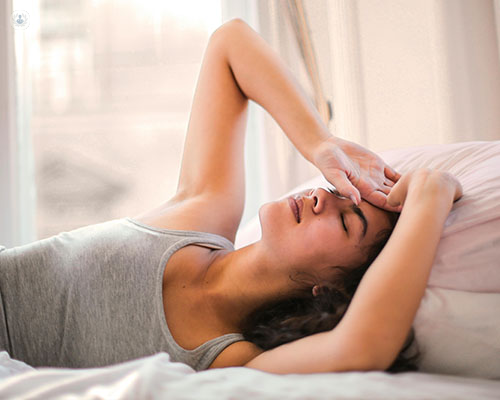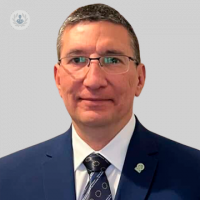Not-so-sweet dreams: all about sleep disorders
Autore:If a bad night’s sleep can ruin your day, the impact of months of unrestful rest can be more than disruptive to your days – it will harm your mental and physical health. A healthy adult needs between seven and nine hours of sleep a night. For those with consistent issues with sleep, they may be suffering from a form of sleep disorder. There are several types of sleep disorders, and they are caused by a variety of conditions and situations. Rest easy, because Professor Carlos Rivas Echeverría is here to share more about sleep disorders.

Sleep is a fundamental aspect of ourselves. We spend one-third of our lives sleeping! Sleep allows our bodies to rest, heal, and replenish energy, and allows our brains to process the prior day’s events. Without sleep, our bodies and minds cannot keep up with the day-to-day activity, and the consequences are dire. There are three stages to the sleep cycle:
- Light sleep, which is more like dozing, where sounds and sensations are sufficient to wake the sleeper.
- Deep sleep, which is when the body is truly asleep but before any dreams. People tend to enter this stage within an hour of trying to go to sleep. People are more difficult to awaken at this stage.
- REM (rapid eye movement) sleep, when the dreaming occurs and takes up around 25 per cent of time asleep. There can be multiple rounds of this during one sleep period.
Those who have consistent trouble sleeping and feel tired in the daytime even though they supposedly got the expected hours of sleep may be suffering from sleep disorders.
Causes of sleep disorders:
Sleep disorders can be caused by current mental concerns, such as being extremely anxious, or stressed about something in your personal life. Light sleepers may have trouble getting rest due to excessive noise in their environment. Perhaps you are going to bed without properly winding down for the night and are thus too amped to relax your body and mind. Those who experience nocturia will also have interrupted sleep. Some neurological conditions, like Parkinson’s, can also affect the quality of sleep via discomfort due to stiffness and tremors. Those who work night shifts can also suffer from sleep disorders.
A few types of sleep disorders:
- Insomnia, the difficulty falling and staying asleep
- Narcolepsy, a chronic neurological disorder where the brain lacks hypocretin, a hormone that is used to regulate sleep-wake patterns. People with narcolepsy will find that they are overtaken by drowsiness during the day and may need to take frequent short naps (also known as hypersomnia).
- Snoring, sleep apnoea, and interruptions to breathing, which will affect the supply of oxygen to the brain and blood and make sleep less restorative than it should be
There is a group of sleep disorders known collectively as parasomnias, where the behaviour when sleeping is abnormal, and includes:
- Sleepwalking, where a person is out of bed and doing activities like cooking, cleaning, eating, or even conversing but is still actually in the condition of sleep even though their eyes are open. They will have no memory of sleepwalking.
- Night terrors and nightmares, where sleep is not restful due to unpleasant dreams and feelings of dread, and may cause the sleeper to wake up suddenly in a panic, act out in response to the night terror, or make them reluctant to sleep at all.
- Bedwetting, which is most common in young children but is not unknown in adults, and indicates that there is something wrong with the body’s self-awakening mechanisms.
What happens if a sleep disorder is left untreated?
People who do not get enough sleep can develop cognitive issues, such as troubles with memory recall, difficulties learning new information, slower reaction times, changes to their personality where they become more irritable or moody, or psychosis and paranoia. Over time, sleep loss can result in unintentional weight loss, hair loss, depression, and the onset of dementia. At the most extreme, chronic sleep disorders can even lead to heart attacks or strokes, due to their effect on cell metabolism.
Sleep disorders can be diagnosed once you approach your doctor with your issues. A physical exam will be conducted to assess how the sleep disorder may be affecting you. It helps to keep a record (a sleep diary) of how much you sleep and the disruptions experienced, and disturbing dreams if any, as a clear reference. The doctor may recommend you visit a sleep specialist to perform a study (polysomnogram) to monitor how your brain behaves whilst you sleep in order to get a definite diagnosis.
Treatment for sleep disorders
Some sleep disorders can be treated with medications, like insomnia with sleeping pills, and narcolepsy with stimulants like modafinil. But most sleep disorders can be corrected with habits and routines that promote restful sleep, such as mitigating stress-inducers with meditation or preparation, and not eating or interacting with gadgets for up to two hours before bed. A CPAP (continuous positive airway pressure) machine is ideal to assist those with breathing issues, and cognitive behavioural therapy may address any psychological roots of the disorder.
The treatment plan will differ depending on the specific needs for which sleep disorder you have, and your doctor should recommend the best course of action for you to get consistent, full nights of rest.
If you’re experiencing trouble sleeping or chronic fatigue, Professor Carlos Rivas Echeverría is available for consultation via his Top Doctors profile.


